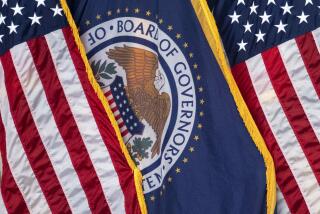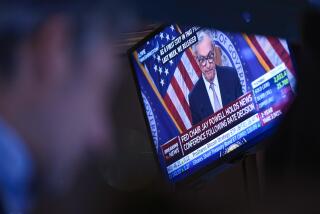Japan Braces for End of Nearly Free Money
- Share via
TOKYO — There are still a few people in Japan warning against an end to the days of interest-free money. The country’s finance minister, for one.
But across the spectrum of economists and monetary policymakers here, there is an almost unanimous chorus predicting the time is up for Japan’s six-year experiment of offering money for short-term loans at 0%.
The Bank of Japan’s nine governors will begin a two-day policy meeting Thursday during which they are expected to raise the key interest rate to 0.25%. Such a move would mark the formal transition of Japan’s economy into a period of expansion, signaling that the era of price deflation is over. “Interest rates are going up,” said Richard Jerram, chief economist for Macquarie Securities.
The Bank of Japan has been suggesting for months that it believes the time has come, pointing to a host of data showing the country has emerged from the economic doldrums of sluggish growth and declining prices.
Profits, consumer bank loans and tax revenues are up. So is inflation, though only slightly, to an annual rate of 0.6%. Unemployment -- never high in Japan where job security is part of a treasured social compact -- is down, to 4% in May from 4.1% in April.
Significantly for the bank, its latest quarterly survey of business confidence showed an increase in optimism, reflected in plans to increase capital spending by 11.6%. That marked the biggest projected jump in 16 years and appeared to be the crowning piece of evidence for a central bank now chafing at the no-interest policy.
“Japan’s economy is continuing a solid recovery, balanced between overseas and domestic demand and between the corporate sector and households,” Bank of Japan Gov. Toshihiko Fukui said Tuesday.
It is Japan’s politicians who have applied the most forceful brakes on the central bank’s drive to raise rates. The bank is an independent institution, but political leaders have not been shy about making their opinions on monetary policy heard. And for some senior officials in the governing Liberal Democratic Party, there is still a fear that a jump in borrowing costs will snuff out a recovery that has taken a long time to kindle.
Finance Minister Sadakazu Tanigaki has been the most vocal critic of a rate hike, warning that deflation may not be licked and urging caution. “Given that there is little concern about inflation, I think zero interest rates are desirable,” Tanigaki said.
Politicians have a bit of history on their side. They point out that the central bank acted too hastily once before, raising rates in the summer of 2000 and cutting short an economic recovery. “It is a sensible political game of looking for cover,” Jerram said, explaining the gulf between the bank and the government on raising rates. “If anything goes wrong in the next 12 months, the politicians can then say: ‘It’s all the bank’s fault.’ ”
But the government also has practical worries. Ripples from a short-term interest rate hike could result in higher rates for longer-term government bonds in a country where public debt hovers around 150% of gross domestic product. That would raise the government’s cost of borrowing, meaning either deeper cuts in public spending or a politically unpalatable tax increase.
Much of that debt has been financed at basement level interest rates three or four rate points below what other countries pay to service their debts. The government has been able to go on a borrowing binge without offering globally competitive interest rates because its debt is held almost exclusively by Japanese institutions.
Bad economic news also nags at the cheerier forecasts: The Japanese consumer apparently still needs convincing that good times are back. Retail sales -- cars and clothes in particular -- remain sluggish. And another government survey this week reported consumer confidence declined for the second month in a row, with a slight majority of Japanese saying they are pessimistic about their job and income prospects.
“There is a lot of data that suggests consumption is continuing to deteriorate,” said Hiromichi Shirakawa, chief economist at Credit Suisse Securities in Tokyo.
That might force the bank to proceed cautiously, Shirakawa said. One option, Shirakawa said, might be to end the zero interest policy, but with a proviso that no further hikes will come until the effect is measured and global capital markets stabilize.
*
(BEGIN TEXT OF INFOBOX)
Benchmark rates
How Japan’s benchmark interest rate compares with that of other central banks:
Australia: 5.75%
U.S.: 5.25%
Britain: 4.5%
Canada: 4.25%
Europe: 2.75%
Japan: 0.001%
Source: Bloomberg News
More to Read
Sign up for Essential California
The most important California stories and recommendations in your inbox every morning.
You may occasionally receive promotional content from the Los Angeles Times.










